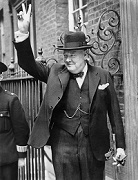Churchill/ Walking with Destiny
For various reasons I’m not a great reader of biography. Most are so long that they take up a month’s reading, they tend to detail day by day the life of the subject rather than provide a full picture of him/her and I do not remember much of the content.
 However I greatly enjoyed Andrew Roberts’ biography of Churchill even though I had read Roy Jenkins’s tome to him and knew much of his life.
However I greatly enjoyed Andrew Roberts’ biography of Churchill even though I had read Roy Jenkins’s tome to him and knew much of his life.
Although it is meticulous in charting his life you do have a three dimensional portrait of a remarkable man. Like many great people he was formed by paradox. The grandson of a duke he could communicate with anyone and had several liberal traits notably his friendship and allegiance to Lloyd George and his welfare reforms as Home Secretary (he invented for example the Labour Exchange).
He undertook many and brave wartime air journeys which claimed many a famous man (Leslie Howard, Glenn Miller, the Duke of Kent, General Gort, Admiral Ramsey). The biography refutes that he was either an alcoholic or depressive. Roberts argues that he could not undertake such a formidable work load if he was so encumbered.
His iron constitution, exemplified by being the only politician/delegate at a banquet with Stalin after a summit who could keep pace with the Russian toasts, contrasted with his tendency to blub.
 He was both talented painter and brick builder; statesman and journalist: a lover of animals with his cat Nelson his constant companion deriving much pleasure when he set on the Munich Mouser, Neville Chamberlain’s cat.
He was both talented painter and brick builder; statesman and journalist: a lover of animals with his cat Nelson his constant companion deriving much pleasure when he set on the Munich Mouser, Neville Chamberlain’s cat.
In times of crisis he never lost his prodigious appetite for food and drink, indeed drew strength from it. Later he said he took exercise at being the pallbearer of friends much fitter than him.
The length of the book (900 pages) is leavened by the wit of Churchill. Most of these witticisms have passed into lore so I will not repeat them.
The criticism is always made of Churchill that he was a great war time Prime Minister but this disguises that his judgment and political allegiances beforehand were deficient – citing Gallipoli, supporting both the Gold Standard and King Edward VIII in the abdication crisis and opposing the independence of India. Yet he was one of the very few to see through Hitler early. The list of those other great and notable men who did not is rather long and conspicuous: Lloyd George, Gandhi , Halifax and King Edward for example.
 You take away from this biography a number of memorable vignettes. After a particularly ferocious bombing of the East End , Churchill made a visit there . One woman said to him “We can take it Winnie, but make sure you give it back . “Oh we will.” He assured. “ With interest. Compound interest ” Of the 100 members of the Danish Resistance who laid lilies at the Cenotaph at the funeral, when asked to give their names to a interviewer they declined: “We never gave our names in the war and we won’t now …” said one. Both stories sum up Churchill’s greatest virtue and asset, namely he not only had huge courage he could instil it in others.
You take away from this biography a number of memorable vignettes. After a particularly ferocious bombing of the East End , Churchill made a visit there . One woman said to him “We can take it Winnie, but make sure you give it back . “Oh we will.” He assured. “ With interest. Compound interest ” Of the 100 members of the Danish Resistance who laid lilies at the Cenotaph at the funeral, when asked to give their names to a interviewer they declined: “We never gave our names in the war and we won’t now …” said one. Both stories sum up Churchill’s greatest virtue and asset, namely he not only had huge courage he could instil it in others.
 I actually attended his funeral in 1965 with my mother’s cousins, twin sisters born and living in Poland who were hidden in a farm in the country to avoid certain death. You cannot imagine anyone now crossing the road let alone Europe to pay their last respects. How much that feeling of hope generated by his radio broadcasts must have meant to the downtrodden war-time peoples of mainland Europe.
I actually attended his funeral in 1965 with my mother’s cousins, twin sisters born and living in Poland who were hidden in a farm in the country to avoid certain death. You cannot imagine anyone now crossing the road let alone Europe to pay their last respects. How much that feeling of hope generated by his radio broadcasts must have meant to the downtrodden war-time peoples of mainland Europe.
Accosting to modern values, Churchill is painted as a white supremacist, drunk and oppressor of strikers at Tonypandy but Roberts’ exhaustive scholarship defeats all of this and the Churchill revisionists.
Flawed? Yes. Paradoxical? Certainly. A great man worthy of this excellent biography? Indubitably.
